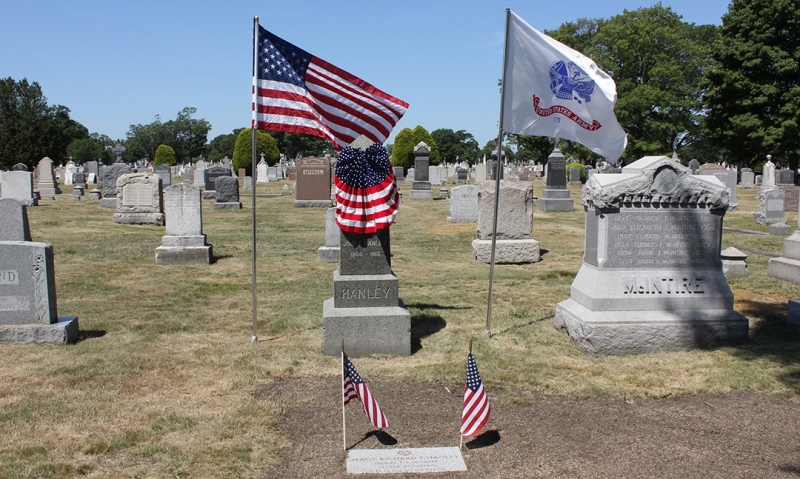
As this year marks the 100th anniversary of World War I, and The American Legion prepares to celebrate its centennial in 1919, Post 69 in Malden, Mass., honored the 140th anniversary of the infamous Battle of Little Bighorn.
The reason for the ceremony two years ago was to provide a military footstone for U.S. Army Sgt. Richard P. Hanley, a Medal of Honor recipient buried in Malden. Hanley served in the 7th Cavalry under Gen. George A. Custer; Post 69 did not know that historic information, or that a Medal of Honor recipient from the Battle of Little Bighorn was buried nearby, until Post Adjutant John Graham received a phone call from the Congressional Medal of Honor Society.
Ray Johnston’s job with the society is to locate Medal of Honor recipients who do not have an appropriate military headstone; Hanley had a family one that did not recognize him as a Medal of Honor recipient. Johnston provided Graham with Hanley’s plot number at Holy Cross Cemetery in Malden. When Graham went to the gravesite and read the headstone, he said, “7th Cavalry … Custer? You’ve got to be kidding me. And he’s buried here!’ To find out he served with Custer blew my mind.”
Since Hanley had a family headstone he wasn’t eligible for a military one paid for by the VA. So Post 69 spearheaded a campaign to provide Hanley with a military footstone that recognized him as a Medal of Honor recipient.
Hanley earned the Medal of Honor for his actions at the Battle of Little Bighorn in Montana on June 25, 1876. His Medal of Honor citation reads, “Recaptured, single-handed, and without orders, within the enemy's lines and under a galling fire lasting some 20 minutes, a stampeded pack mule loaded with ammunition.”
On June 25, the 7th Cavalry was transporting 24,000 rounds of ammunition on pack mules and Hanley was one of the soldiers on their way to assist Custer during the Battle of Little Bighorn, often called Custer’s Last Stand. During the heavy enemy fire, a pack mule carrying 1,000 rounds of ammunition got frightened ran directly toward the enemy. Hanley mounted his horse and “rode through a withering hail of bullets, directly into the face of the enemy, in pursuit.” After 20 minutes of chasing the mule and racing through enemy fire, he got a hold of the mule and returned to his comrades who were in desperate need of the ammunition. That same day, Custer was killed, along with 267 of his fellow soldiers.
Hanley served 30 years in the U.S. Army and retired in New York City, where he died in September 1923.
Post 69 held a gravesite ceremony on June 25, 2016, the 140th anniversary of the battle. The more than 100 attendees included post members, Malden police and fire department, the National Guard, Chelsea Soldiers Home staff and residents, city councilors, members of the 7th Cavalry from the Vietnam War, then-Massachusetts State Commander Kenny Stark and Past National Commander Jake Comer, who was a guest speaker. Veterans in period uniform were present, as well as a riderless horse carrying rear-facing boots – the symbol of a fallen soldier. And the 7th Cavalry’s marching tune, “Garryowen,” was played.
Hanley’s military footstone now rests in front of his family’s headstone and reads, “Sgt. Richard P. Hanley, Medal of Honor, Little Bighorn, CO. C. 7th U.S. Cavalry.” The cost of the footstone, the placing of it at the cemetery, and invitations for the event was at no cost to Post 69.
“Everyone was all in; it was a team effort from the post members and the community,” Graham said. “It just went fantastic. It was absolutely incredible.”



